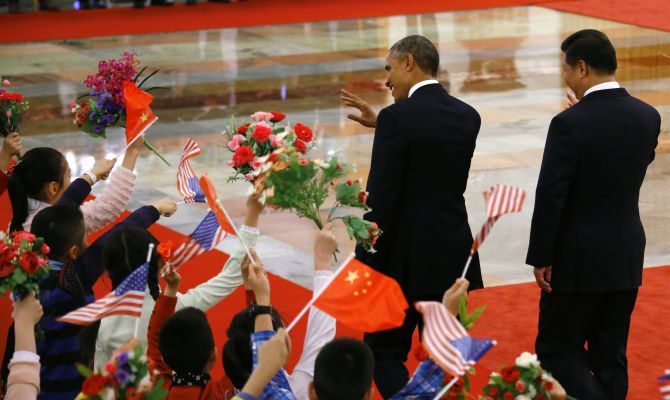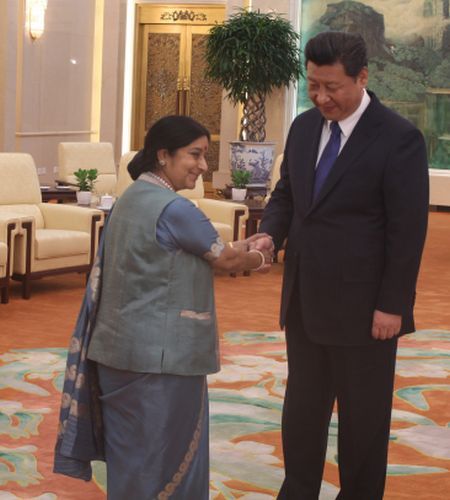'Any fear or apprehension that this dialogue is aimed towards China, that is mistaken.'
As John Kerry and Sushma Swaraj deny that China featured in their dialogue, Aziz Haniffa/Rediff.com listens in.

'This meeting has nothing to do with China. We made no mention of China in this conversation. This is about the US-India relationship, two great democracies -- the oldest and the largest -- that have come together, brought together by common values about freedom and opportunity, innovation, the ability of people to make choices in their life and to do as well as they can.'
'There's no message to China here intended other than the sort of normal commerce and cooperation that goes on in the world by countries of like mind that want to create a better relationship without regard to geopolitics and chess moves on the political stage.'
Thus US Secretary of State John Kerry tried to knock down the nagging perception in some quarters that the US-India Strategic Partnership is aimed at containing China, an obsession of neo-conservatives in the United States who believe this should be the major single focus in cultivating democratic India vis-a-vis authoritarian China.
Kerry would have nothing of it when at the conclusion of the first US-India Strategic and Commercial Dialogue at a State Department news conference, he was asked if Washington's Asia rebalance and this particular dialogue with India was designed to send a message to China that 'it's not the only player in the Asia Pacific realm', making the remarks reproduced above.
'This is about a country that has millions of people still living in poverty, a country of great innovative capacity that wants to provide for its people and grow effectively, and we see in our common relationship very important common goals,' he added.
'It is also about our mutual security interests, and I suppose tangentially you could argue that because we are in common accord with respect to the South China Sea and rule of law, that that is a message to China,' Kerry said.
'It is really a message to everybody, to all countries,' Kerry reiterated 'that freedom of navigation and rule of law are the standard that we have been working for and towards in concert with the global community under the United Nations and otherwise ever since the end of the last world war, and with a great commitment to try to end conflicts between States.'
'And now we face an increased challenge of non-State actors presenting the greatest challenge to all of us. So that's what we are talking about, and we welcome China at the table to discuss with us, and we will be discussing with China in the next days in President Xi's visit here in Washington and in New York at the United Nations General Assembly.'
On Tuesday, September 22, China's President Xi Jiping arrived in Seattle, the first stop of his state visit to the US, which will end at the White House later this week.
'I would like to reiterate what he (Kerry) said: China did not even figure in our conversation,' India's External Affairs Minister Sushma Swaraj said, when she was asked how the India-US dialogue enhanced India's efforts to expand its own economic and political influence across Asia.

'This is a bilateral dialogue between India and United States. This is a dialogue to deepen and strengthen our bilateral cooperation, our bilateral ties, and this dialogue has not been charted to create wider influence in any part of the world or China,' Swaraj added.
'And for your information,' Swaraj said, 'I would like to tell you that the United States has the same dialogue mechanism with China too. It is called the Strategic and Economic Dialogue. With India it is called Strategic and Commercial Dialogue.'
'So they have the same dialogue mechanism with China,' the minister added, 'so any fear or apprehension that this dialogue is aimed towards China or for wider influence in that part of the world, that is mistaken.'










